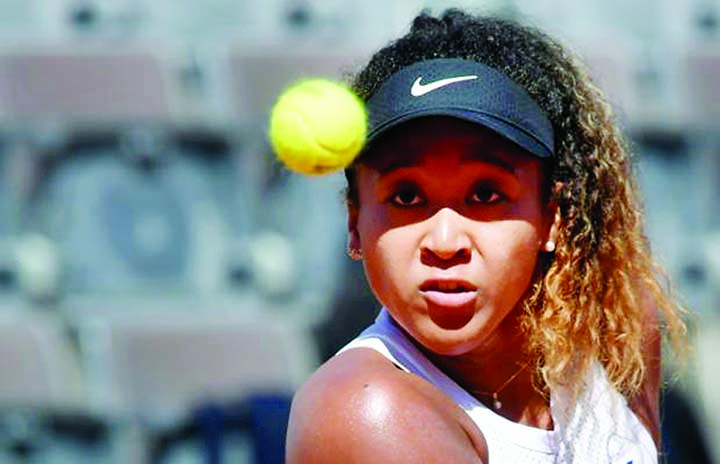
AFP, Paris :
Twelve months ago at Roland Garros, an embarrassed Naomi Osaka bristled at being hailed as the ‘coolest thing’ in tennis.
Now, however, the 21-year-old Japanese returns to Paris as comfortably the sport’s hottest ticket with the world number one billing, a bank balance bursting at the seams and on the brink of a third successive Grand Slam title.
“The one word that comes to my mind is amazing,” says Osaka’s older sister Mari, a fellow tour player.
“I’m really proud of her.”
Naomi Osaka was seeded at a Grand Slam for the first time at the 2018 French Open when she made the third round, countering claims she was the ‘coolest thing in tennis’ by asserting she was the sport’s ‘most awkward person’.
But it was the razzle-dazzle of New York – helped by a mega-meltdown by Serena Williams – which propelled her to a maiden Slam triumph in September.
That was backed up by a second major at the Australian Open, her status as the face of the new generation of women’s tennis comfortably confirmed.
Osaka, the daughter of a Haitian father and Japanese mother, has since been signed up by Nike in a deal reportedly worth in the region of $10 million a year.
Despite being based full-time in the United States and still often struggling with the Japanese language, sponsors from home have come calling – from an airline and car-maker to a noodle company and detergent manufacturer.
In Japan, her coy personality and breezy news conferences have made her into a media darling.
‘Naomi-speak’ was among the most searched phrases online in 2018.
“She’s multicultural, multinational, multiracial,” Stuart Duguid, Osaka’s agent and an IMG executive, told Britain’s Financial Times.
However, fame still sits uncomfortably with Osaka whose career earnings have already rocketed past the $11 million mark.
In the wake of her Australian Open triumph, she shocked tennis by splitting with coach Sascha Bajin, one of the masterminds of her meteoric rise.
Her 2019 results, meanwhile, have been steady rather than spectacular – she hasn’t reached another final since Melbourne while her clay court season has been blighted by injury.
An abdominal strain forced a pullout from Stuttgart while a hand injury sparked an early departure from Rome last week.
Not that Osaka is getting too down on herself.
“Grand Slams to me are like a playground, I have a lot of fun there,” she said ahead of Sunday’s French Open start.
Clay courts, too, are becoming bearable for a player whose power game traditionally thrives on faster courts.
At Roland Garros last year, Osaka was serving at 121mph (196.2k/ph), a speed matched only by Serena Williams.
This year alone, she has unleashed 184 aces across all surfaces.
“I think for me, I’m kind of comfortable with clay now. It’s just like I randomly slip. I feel like if I can get that under control, I’ll be good.”
Her status in the women’s game in general will endure even wider exposure in 2020 when she is likely to shape the image of the Tokyo Olympics.
It’s all a far cry from the days when Mari used to get the better of her younger sibling when they were growing up in the US.
Back then, Naomi always had that something extra even if it wasn’t immediately apparent.
“Sometimes I think she was throwing the matches on purpose just so that we could finish practice quicker,” recalls Mari.
“So the moment she started trying, I was getting pissed off.”

